Key takeaways:
- The modern Olympic Games evolved from ancient Greece, uniting city-states and later serving as a platform for national identity in the late 19th century under Pierre de Coubertin.
- Significant political events, such as the Cold War and the 1980 Moscow Olympics boycott, illustrate how the Games have often intersected with global politics and nationalism.
- Iconic moments like the 1936 Berlin Olympics and the 1968 Mexico City Olympics highlight how athletes have used the platform for political expression and social change.
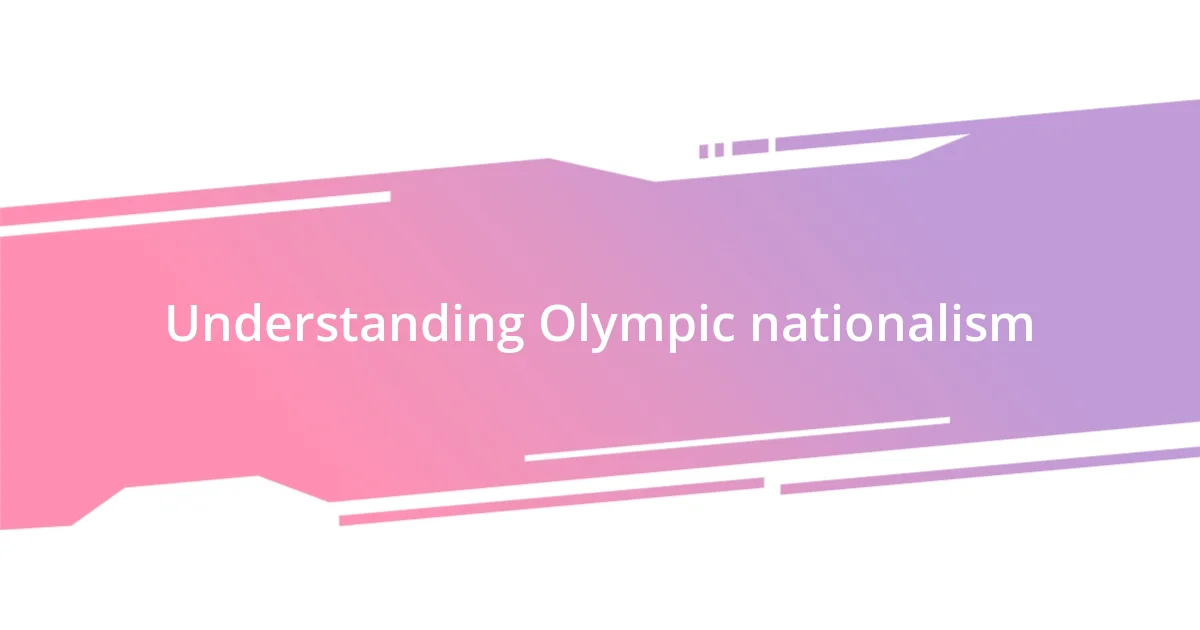
Understanding Olympic nationalism
Olympic nationalism is a fascinating phenomenon that captures the spirit of competition and pride on a global stage. I remember watching the Olympics as a child, feeling a rush of excitement when my country’s flag was raised during medal ceremonies. Isn’t it incredible how these moments can unite an entire nation, igniting collective joy or sorrow?
At its core, Olympic nationalism intertwines individual achievements with national identity, creating a powerful narrative that resonates deeply with spectators. When I see athletes wearing their national colors, I can’t help but feel a sense of unity and purpose. It’s as if their success or failure reflects on all of us, raising questions about our own national pride and identity in a world that often feels divided.
This emotional connection can be double-edged. While it fosters national pride, it can also lead to unhealthy rivalries and pressure on athletes to achieve greatness for their homeland. Have you ever thought about the burden athletes might carry as they compete not just for themselves, but for an entire nation’s honor? For many, the weight of those expectations shapes not just their sporting careers, but their personal identities as well.
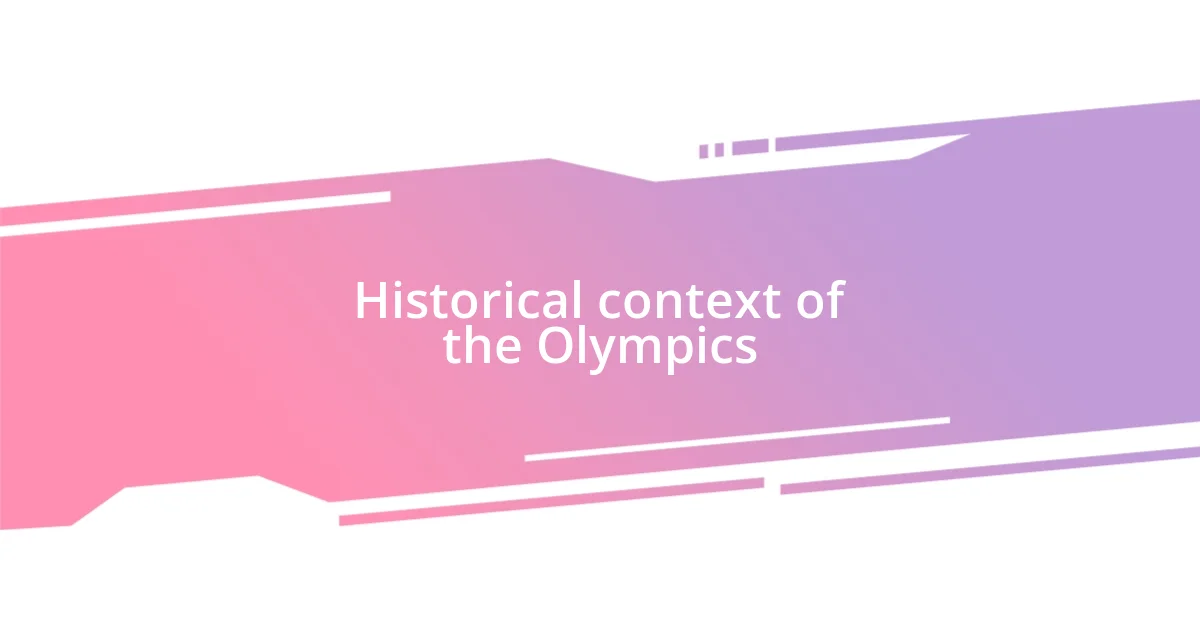
Historical context of the Olympics
The modern Olympic Games have their roots in ancient Greece, where athletic competitions honored the gods and celebrated human physicality. I’ve often pondered how those early games, held in Olympia, were not just about sports, but about fostering unity among the fiercely independent city-states of Greece. It’s intriguing to think that even then, the spirit of competition carried a nationalistic flavor, as victors brought glory to their homeland.
Fast forward to the late 19th century, and you find Pierre de Coubertin reviving the Olympic spirit, with an emphasis on peace and cooperation through sport. This revival coincided with growing national identities across Europe, creating a platform not just for athletic prowess, but also for showcasing national pride. I can picture the enthusiasm during those early modern games, where nations began to frame their identity through athletic competition. Isn’t it fascinating how this blend of sport and nationalism began to shape modern culture?
Throughout history, each Olympic event has reflected the socio-political climate of its time. From the boycotts during the Cold War to the recent emphasis on diversity and inclusion, the Games have continually evolved alongside global issues. I think about the stories behind those moments—the joy, the heartbreak, the triumph—all tying back to the larger narrative of national identity. It’s an ever-shifting canvas, and I can’t help but wonder what future games will reveal about our evolving sense of nationalism.
| Year | Historical Context |
|---|---|
| 776 BC | First recorded Olympic Games in ancient Greece, promoting unity among city-states. |
| 1896 | Modern Olympics revived by Pierre de Coubertin; tied to rising national identities in Europe. |
| 1980/1984 | Cold War tensions led to significant boycotts, illustrating the Games’ political implications. |
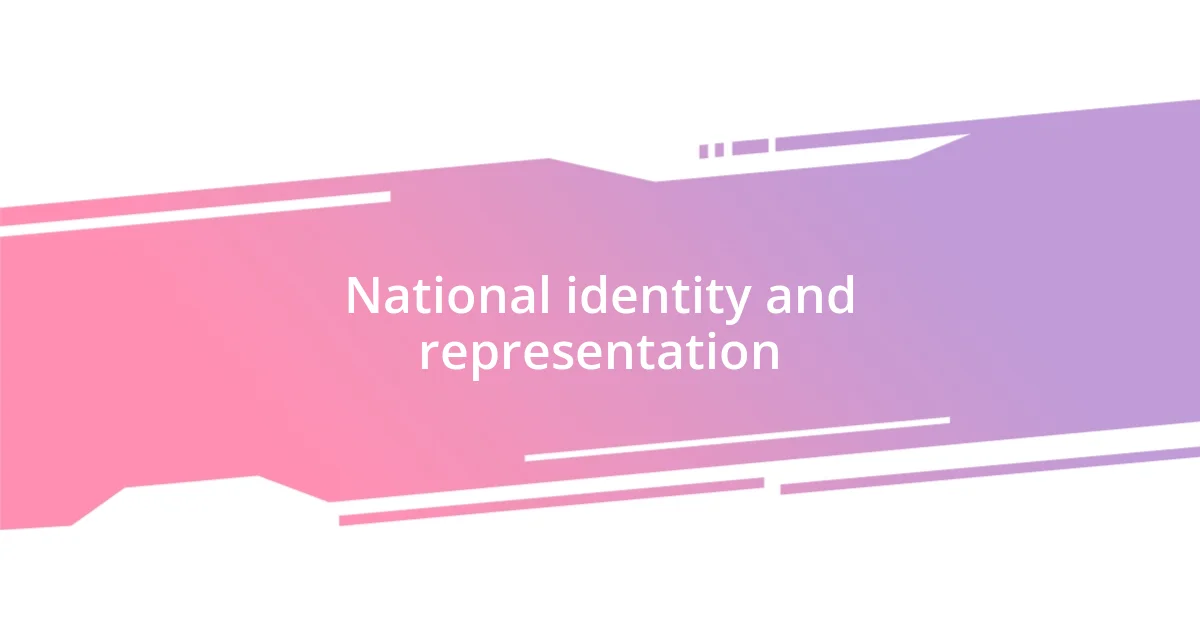
National identity and representation
The representation of national identity during the Olympics is a powerful demonstration of what it means to be part of a country. I’ve seen athletes rise to prominence, their successes weaving into the fabric of our national narrative. It’s touching to witness how one individual’s triumph becomes a shared victory, igniting pride and prompting countless celebrations in the streets back home.
- Athletes often act as ambassadors of their nation, showcasing the values, culture, and resilience of their people.
- The way countries display flags and anthems during medal ceremonies reinforces a sense of belonging and solidarity.
- I recall how during a particular Olympics, a racer from my country broke a record and everyone gathered to cheer, feeling an almost palpable connection to something larger than ourselves.
In this sense, national identity becomes a canvas, painted with the emotions of victories and defeats alike. Each competition offers a chance for countries to reflect on their ideals, struggles, and aspirations, often drawing the attention of global viewers. Witnessing athletes succeed can evoke tears of joy not just for their skill, but for what their achievement represents; it’s about realizing that, in those moments, we’re all part of something bigger.
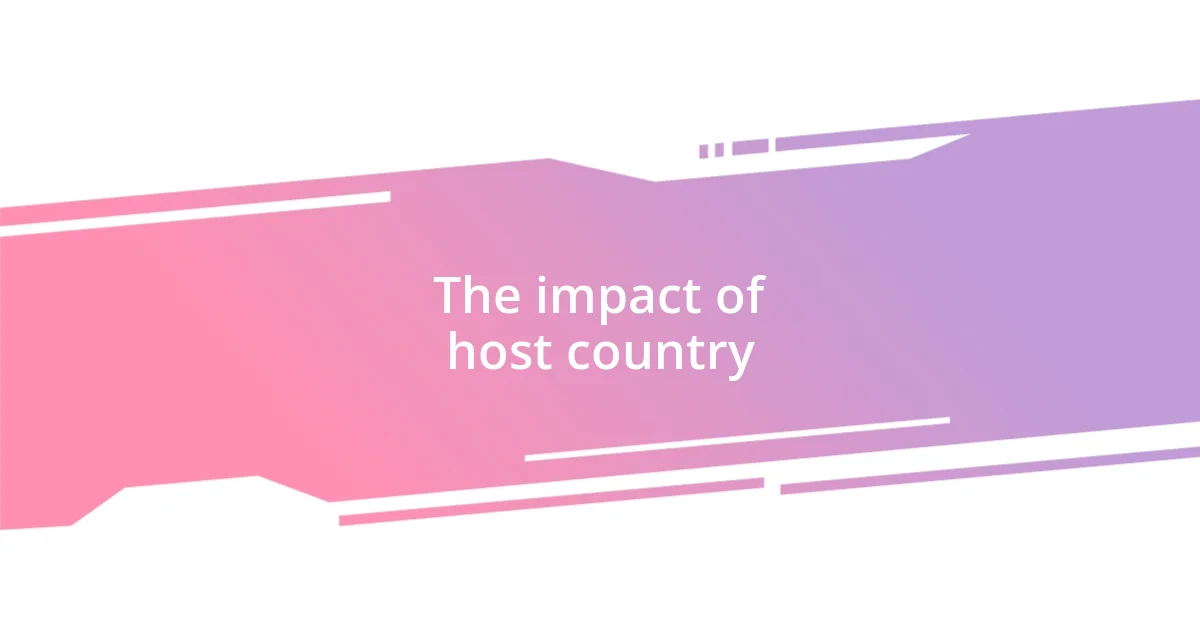
The impact of host country
The host country’s impact on the Olympics is profound, shaping not just the atmosphere but also the political narrative of the event. I remember the palpable tension in the air during the 2008 Beijing Olympics, where the grand spectacles and state-controlled narratives created an aura that was both mesmerizing and unsettling. How does a nation balance pride and politics while hosting the world’s biggest sporting event?
With each Olympic Games, the host nation gets a unique chance to project its national identity to an international audience. I can recall the vibrant displays of culture during the opening ceremony in London 2012. It was exhilarating to see the UK showcasing its history and creativity on such a grand scale. It made me ponder: Does the exuberance of hosting amplify a nation’s sense of purpose?
The commitment to infrastructure and promotion reflects the host country’s priorities, often intertwining sport with national development. Consider how Brazil invested heavily in the Rio 2016 Games, aiming to bolster tourism and improve urban areas. I felt a mixture of hope and skepticism at the time, questioning if the investment was truly aimed at lasting change or merely a fleeting display of national pride.
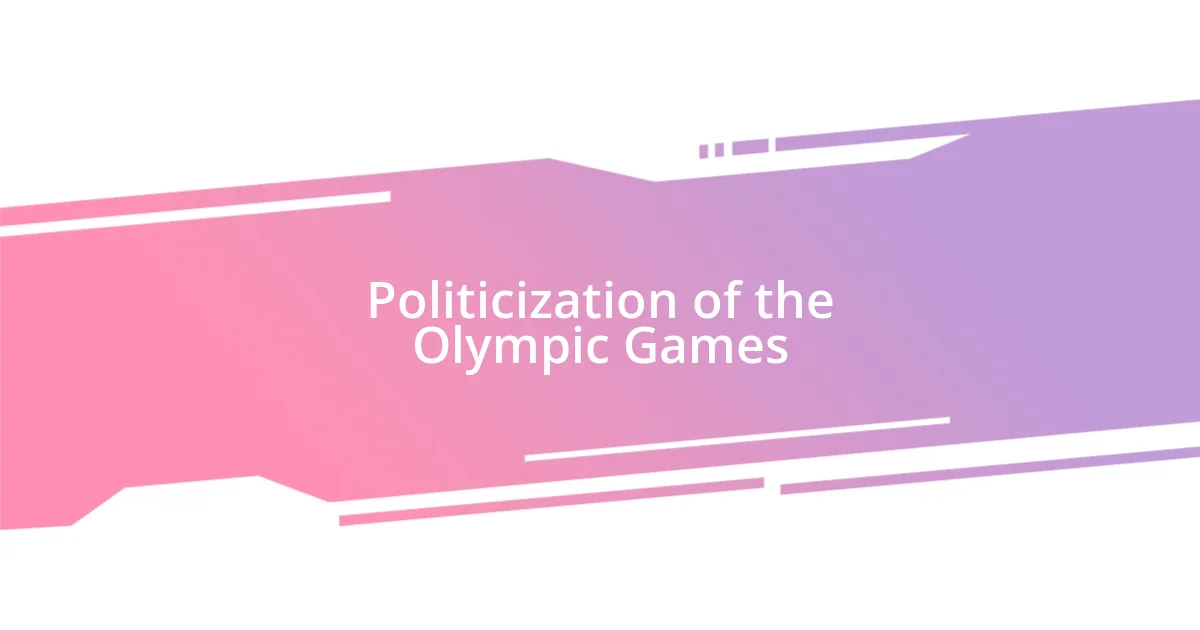
Politicization of the Olympic Games
The Olympic Games have often become a stage for political maneuvering, where nations leverage sporting excellence to project power. I vividly recall the controversy surrounding the 1980 Moscow Olympics, where many countries boycotted the event in protest against the Soviet invasion of Afghanistan. This action spoke volumes—not just about the athletes who were silenced, but about how sport can intersect with global politics. Isn’t it fascinating how a single sporting event can reflect national tensions?
As I think back on my own experiences, I remember how discussions about the Olympics infiltrated conversations in my hometown during contentious periods. The games often serve as a reminder of unifying themes amidst division—an odd juxtaposition that I find compelling. When athletes speak out on social issues during Olympic seasons, it raises the question: Shouldn’t the spirit of the games be a catalyst for change rather than merely a spectacle?
Economic frameworks, too, get woven into the fabric of the Games and influence political agendas. It was striking to see the investments made in London leading up to the 2012 Olympics, which transformed the East End. But I can’t help but question, at what cost do these transformations come? It makes me ponder the true impact of the Games on the everyday lives of citizens, often overshadowed by the grandeur of international competition.
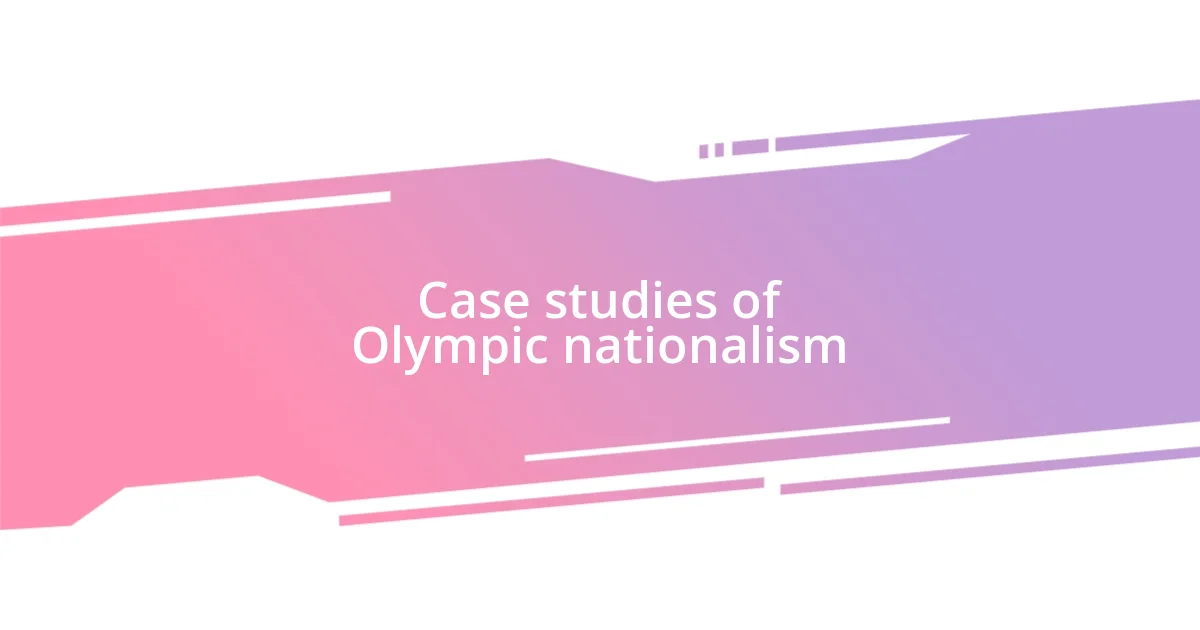
Case studies of Olympic nationalism
One of the most striking examples of Olympic nationalism is the 1936 Berlin Olympics, where Nazi Germany orchestrated the event to showcase its ideology. I remember learning about the intense propaganda efforts that transformed the Olympics into a platform for Hitler to promote Aryan supremacy. It’s chilling to consider how sports, meant to unite, were manipulated for divisive nationalistic objectives. How did this reshape the global perception of the Games forever?
Fast forward to the 1968 Mexico City Olympics, where Tommie Smith and John Carlos raised their fists in a powerful Black Power salute during the medal ceremony. This bold act of defiance not only sparked conversations about civil rights but also highlighted the role of athletes as political figures. I often wonder if such acts are as effective today—can a moment in sports genuinely alter the political landscape, or is it an echo that fades away too quickly?
In my own reflections on the Olympic spirit, the 2014 Sochi Games stand out as a case of nationalism entwined with controversy over Russia’s policies. The vibrant showcasing of Russian culture felt overshadowed by global discussions on human rights. I felt a tumult of pride and discomfort while watching the events unfold, recognizing that national identity can be both a source of pride and a trigger for critical global dialogues. What does it say about our values when the world’s stage brings out both the best and the worst in us?














